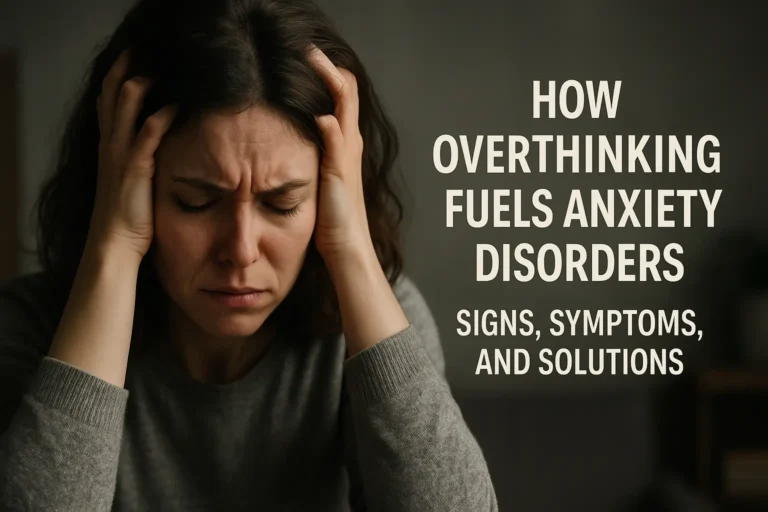How Overthinking Fuels Anxiety Disorders: Signs, Symptoms, and Solutions
Expert Insights from GloFusion in Griffin, GA
Overthinking often feels like a harmless habit—constantly analyzing conversations, decisions, and potential outcomes. But when it becomes chronic, overthinking can fuel anxiety disorders, intensifying worry, fear, and emotional exhaustion.
At GloFusion, we help individuals recognize when thought patterns are no longer productive but are actually harming mental health. Let’s dive into how overthinking feeds anxiety—and how you can start to break free.

Page Contents
The Vicious Cycle: How Overthinking and Anxiety Feed Each Other
Overthinking and anxiety are deeply interconnected. When you overanalyze every situation, your brain remains stuck in a state of perceived threat, increasing stress hormones and emotional tension. This can make anxiety symptoms worse, creating a cycle that’s hard to escape.
Key ways overthinking worsens anxiety:
🔁 Replaying conversations and imagining worst-case scenarios
📉 Increased cortisol levels and physical tension
💭 Intensifying doubts and fears about future outcomes
🚷 Avoidance of decisions or social situations
😴 Disrupted sleep due to racing thoughts (Mayo Clinic)
At GloFusion, we work with clients to identify these cycles early and provide strategies to interrupt them before they spiral.
Common Signs That Overthinking Is Hurting Your Mental Health
Not every bout of deep thought is harmful. But when your thinking becomes repetitive, distressing, and overwhelming, it’s a clear signal that intervention might be needed.
Warning signs include:
📚 Constantly revisiting past mistakes
🧠 Obsessing over future events that may never happen
🚷 Struggling to make even small decisions
🛌 Difficulty falling asleep or staying asleep due to racing thoughts
😟 Feeling stuck in a loop of worry and doubt (National Institute of Mental Health)
Recognizing these signs is the first step toward regaining control over your mind and your peace.
The Hidden Costs of Chronic Overthinking
Beyond anxiety, chronic overthinking can erode overall mental health over time. It places constant strain on emotional resources, leading to burnout, depression, and even physical health problems like high blood pressure.
Long-term risks associated with overthinking:
📉 Increased risk of major depressive disorder
📈 Higher likelihood of developing chronic stress-related illnesses
🧠 Cognitive fatigue and impaired decision-making
💔 Strained relationships from over-analysis or withdrawal
💤 Ongoing sleep disturbances and insomnia (Healthline)
At GloFusion, we emphasize early intervention—because the longer overthinking patterns persist, the harder they are to break without support.

Effective Solutions for Breaking the Cycle
While breaking free from overthinking isn’t easy, it’s absolutely possible with the right tools and support. Treatment focuses on challenging irrational thought patterns and building healthier coping strategies.
Evidence-based techniques include:
🧘 Practicing mindfulness to anchor thoughts in the present
🗣 Cognitive Behavioral Therapy (CBT) to restructure negative thinking
📋 Setting designated “worry times” to contain ruminations
🧠 Using thought-stopping techniques and positive self-talk
📱 Limiting exposure to stress triggers like social media (American Psychological Association)
At GloFusion in Griffin, GA, we offer personalized strategies, therapy, and support designed to help you quiet the noise and reclaim your mental peace.
Conclusion: You Can Break Free from Overthinking
Overthinking doesn’t have to define you. By understanding its impact and using proven techniques, you can break the cycle, reduce your anxiety, and live with more clarity and calm.
👉 Feeling stuck in an overthinking cycle? Contact GloFusion today to start your journey toward a calmer, clearer mind.

